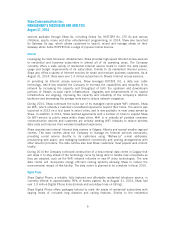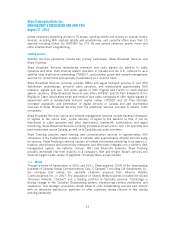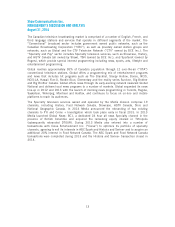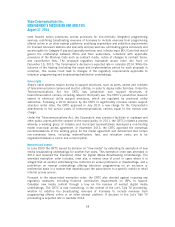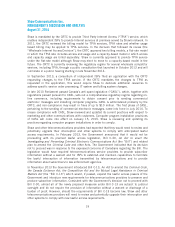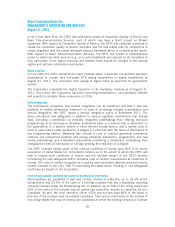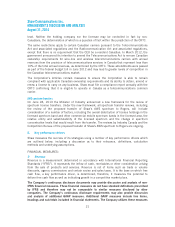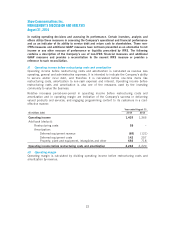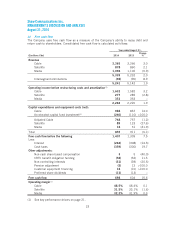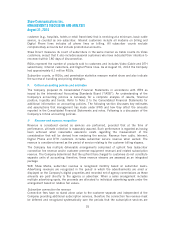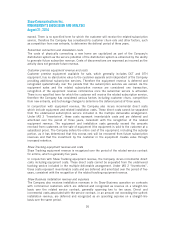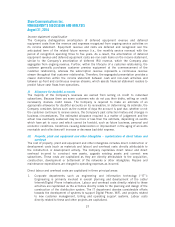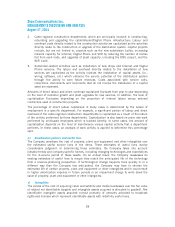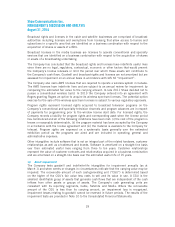Shaw 2014 Annual Report Download - page 23
Download and view the complete annual report
Please find page 23 of the 2014 Shaw annual report below. You can navigate through the pages in the report by either clicking on the pages listed below, or by using the keyword search tool below to find specific information within the annual report.Shaw Communications Inc.
MANAGEMENT’S DISCUSSION AND ANALYSIS
August 31, 2014
Shaw is mandated by the CRTC to provide Third Party Internet Access (“TPIA”) service, which
enables independent ISPs to provide Internet services at premises served by Shaw’s network. In
2011, the CRTC reviewed the billing model for TPIA services, TPIA rates and whether usage
based billing may be applied to TPIA services. In the decision that followed its review (the
“Wholesale Internet Access Decision”), the CRTC approved two billing models, a flat-rate model
in which the TPIA rate includes access and usage and a capacity-based model in which access
and capacity usage are billed separately. Shaw is currently approved to provide TPIA service
under the flat-rate model although Shaw may elect to move to a capacity-based model in the
future. The CRTC is currently reviewing the regulatory regime for several wholesale competitor
services, including TPIA, through a public consultation that launched in October 2013 and will
culminate in a public hearing starting in late November 2014.
In September 2013, a consortium of independent ISPs filed an application with the CRTC
requesting changes to the TPIA service. If the CRTC mandates the changes to TPIA as
requested in the application, this would require Shaw to dedicate additional resources to
address specific service order processing, IT system and billing system changes.
In late 2010 Parliament passed Canada’s anti-spam legislation (“CASL”), which, together with
regulations passed pursuant to CASL, sets out a comprehensive regulatory regime regarding on-
line commerce, including requirements to obtain consent prior to sending commercial
electronic messages and installing computer programs. CASL is administered primarily by the
CRTC, and non-compliance may result in fines of up to $10 million. The first phase of CASL,
pertaining to the sending of commercial electronic messages, came into force in July 2014. To
ensure compliance with CASL, Shaw reviewed and updated its current practices with respect to
marketing and other communications with customers. Computer program installation provisions
of CASL will come into effect on January 15, 2015. Shaw is reviewing and updating its
practices regarding computer program installations in order to comply.
Shaw and other telecommunications providers had expected that they would need to review and
potentially upgrade their interception and other systems to comply with anticipated lawful
access requirements. In February 2013, the Government announced that it would not be
proceeding with its planned lawful access legislation, Bill C-30, An Act to enact the
Investigating and Preventing Criminal Electronic Communications Act (the “Bill”) and related
plan to amend the Criminal Code and other Acts. The Government indicated that its decision
not to proceed was in response to the expressed concerns of Canadians regarding the Bill. The
legislation would have required telecommunications service providers to provide subscriber
information without a warrant and for ISPs to establish and maintain capabilities to facilitate
the lawful interception of information transmitted by telecommunications and to provide
information about subscribers to law enforcement agencies.
In November 2013 the Government introduced Bill C-13, An Act to amend the Criminal Code,
the Canada Evidence Act, the Competition Act and the Mutual Legal Assistance in Criminal
Matters Act (the “Bill C-13”) which would, if passed, expand the lawful access powers of the
Government and introduce new requirements for telecommunications providers to preserve and
produce subscriber information. Consistent with the Government’s decision not to proceed with
Bill C-30, almost all of the newly proposed measures under Bill C-13 are subject to judicial
oversight and do not require the provision of information without a warrant or discharge of a
burden of proof. However, should the requirements of Bill C-13 become law, Shaw and other
telecommunications providers will need to review and potentially upgrade their interception and
other systems to comply with new lawful access requirements.
19


